
From ‘how to tie a tie’ to ‘best lawyer near me,’ search engines around the world are in constant motion. In fact, the average person conducts 3-4 online searches on Google every day.
If you’re a lawyer, this means countless prospective clients are constantly looking online for legal help. Securing more of those clients will require a robust digital presence and increased web traffic, which blogging can help build.
In 2018, 24% of law firms reported having a blog, so if you aren’t blogging, your competitors probably are.
Don’t lose out on prospective clients. Maximize your marketing channels by targeting compelling legal blog topics on your firm’s blog.
Why is blogging important for law firms?
If a prospective client has just been charged with a crime or needs legal advice, where do they turn?
Most people will go online and look for one of two things: a lawyer or legal advice from the most trustworthy source available.
Law firm sites target prospective clients looking for lawyers. But blogs can help you target clients who are looking for information, as well.
And they’ve been proven to work. In fact, according to data from HubSpot, websites that blog get 55% more visitors than those that don’t.

That’s a 55% greater chance to land a client. And once again, data shows opportunity pays off. A study from Aberdeen Group found that conversion rates are six times higher for companies that blog than for those that don’t.
Of course, sometimes starting a legal blog while running or marketing a legal firm can be a challenge. So we’ve put together a few legal blog topics to help get you started on this top law firm marketing idea.
5 lawyer blog topics to write about on your firm’s website
For lawyers, it’s hard to overstate the value of planning and strategy. Without a solid strategy and a detailed plan of action, even the best of cases can have an undesirable outcome.
That’s true for blogs as well. Having the right strategy is key to securing new clients with your blog.
Blogging strategies take in-depth industry and competitor analysis, as well as thorough keyword research for search engine optimization. Plus, you’ll need some top legal blog topics to help you target the right audience.
1. Recent changes in law
First, you can create blogs detailing recent changes in the law. These attract clients confused by misleading news headlines.
For example, Attorney Mayes Telles of Phoenix produced a series of articles discussing changes to Arizona Laws on his blog. The articles receive strong organic traffic and rank highly in search engine results pages (SERPs).
Here’s an example of a clarifying article created by the Telles firm about changes to Arizona laws on wearing disguises or masks during a crime.

Telles’ articles position his firm as an industry expert, and that helps attract prospective clients.
2. Legal advice for your area of specialty
Dishing out legal advice for your area of specialty, such as divorce or criminal defense, is another way to build a strong foundation for your blog.
For example, if you practice elder law. You can write articles on subtopics like:
- Guardianship
- Estate Planning
- Power of Attorney
- Advanced Directives
Each of these subtopics can support multiple blog posts. These legal blog topics will help you attract the audience you want to target. And that makes for a higher chance of converting website visitors into clients.
3. FAQs
Articles describing frequently asked questions are another excellent blog topic idea.
FAQs are so valuable that many lawyers have created dedicated FAQ pages. Take Will & Will, a leading Seattle criminal defense attorney, for example.

Expanding questions from FAQ pages into full-length blog posts targets those looking for specific legal help.
Remember, if your current clients are asking the question, future clients probably need an answer, too. Blogs can help give them that answer and then lead them right to your services.
4. Play legal ‘Mythbuster’
Playing the legal ‘Mythbuster’ in your blogs can draw in significant web traffic because myths are so pervasive in the legal industry.
You can write individual myth-busting blogs on specific legal myths you’ve heard, such as how defamation cases can still be tried even if you said ‘in my opinion’ before a statement.
Or you can create one long, more general myth-busting blog to address common legal myths. Attorney Christopher Dematteo and his firm went this route. They created a thorough 2,000+ word piece discussing common legal myths.
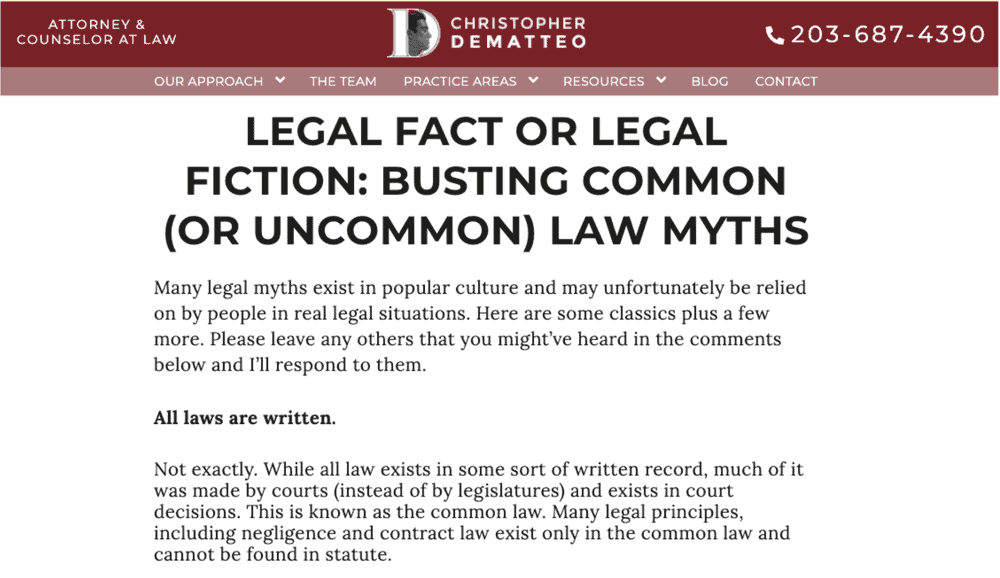
Either way, myth-busting blogs help target important keywords and positions your firm as an industry leader.
5. Trial process guides
The trial process is scary and confusing for defendants, to say the least. Using your experience to eliminate just a little bit of that fear and confusion can help you win over prospective clients.
Try creating trial process guides for each type of case your firm covers. That way, when a potential client types in “what to expect at BLANK trial?” your blog will be first to appear.
You can also create a general trial process guide like Sevens Legal, APC did. Their blog has been viewed thousands of times and is easily replicable.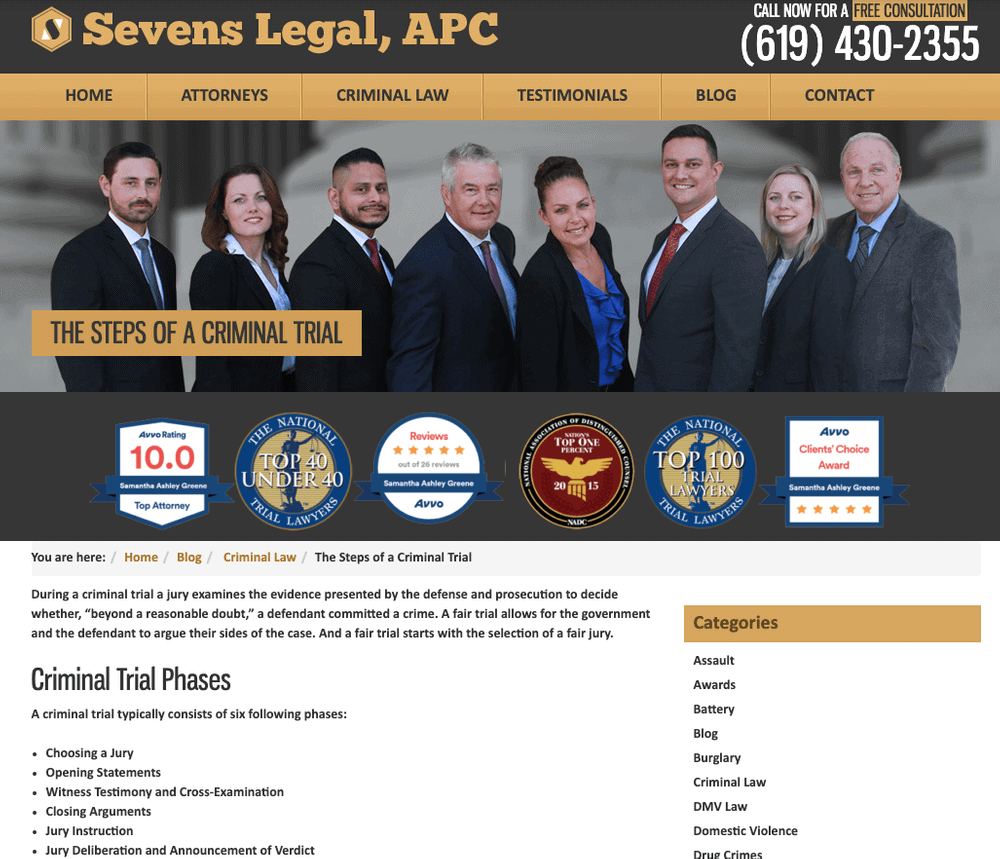
Brainstorming tip: Finding legal blog topics using Google Trends
After you’ve written dozens of articles for your blog, finding new lawyer blog topics isn’t always easy.
Thankfully, there are free tools like Google Trends, to help you out. Google Trends aggregates search data allowing you to see the search interest of potential blog topics and so much more.
One of the most useful features of the tool is the ability to compare keywords. This allows you to decide which keywords you should be targeting in your blogs.
Take this example. Have you ever wondered whether more people search for ‘criminal defense attorney’ or ‘criminal defense lawyer?’
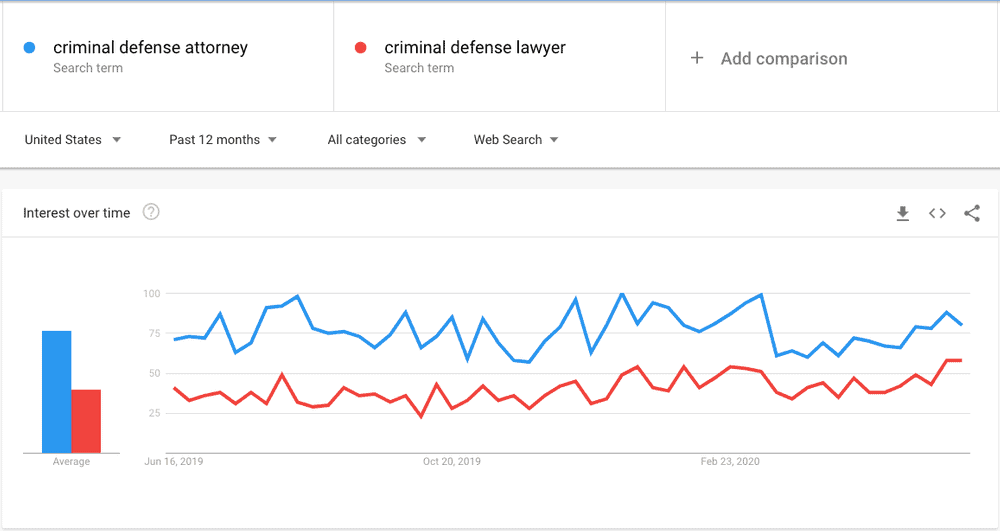
According to the data, ‘criminal defense attorney’ is searched about twice as often. This could help you decide which keywords to target in blogs.
And that’s not all Google Trends can do. There is also a geographic search feature that shows the search volume by region.
For example, according to the data, every state in this country searches the term ‘attorney’ more than ‘lawyer.’
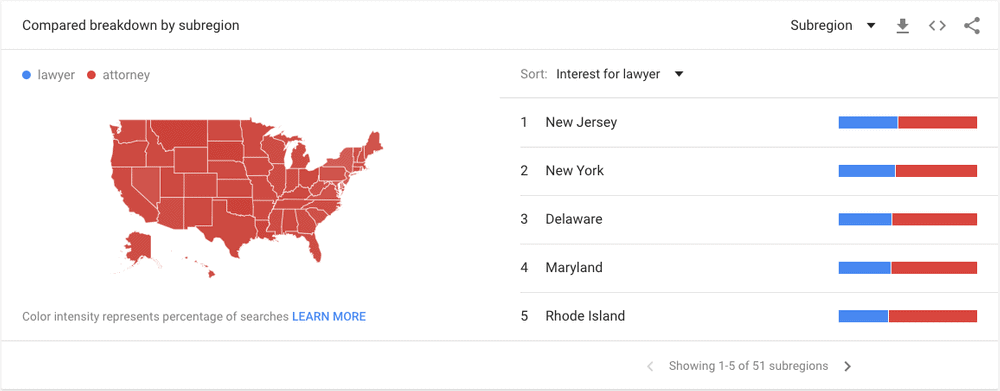
And finally, you can use Google Trends related queries and searches section to find quality, trending blog topics.
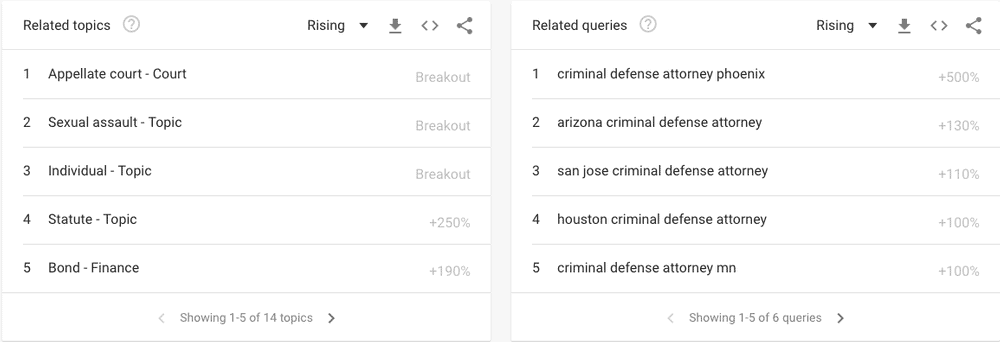
Brainstorming tip: Finding legal blog topics using Google Suggest and People Also Ask
If Google Trends isn’t enough to find strong blog topics, Google has a few more tools up its sleeve that can help.
First, there’s Google Suggest, also known as the autocomplete feature.
By inputting a question word plus a keyword in the Google search bar, you can discover related topics.
For example, you could type ‘how’ and ‘criminal defense lawyer’ into Google. Then, you might find it makes sense to blog about the average cost of a criminal defense attorney since the question is inputted into Google so often.
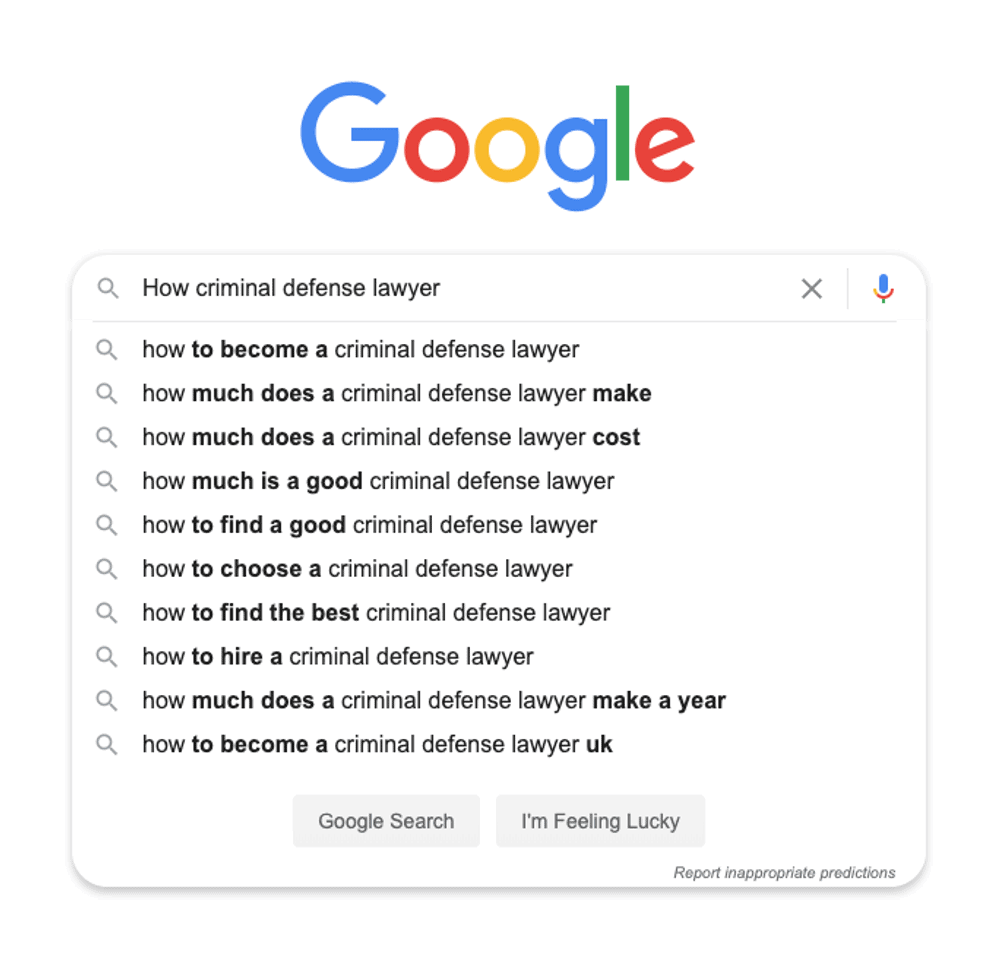
Secondly, there’s the People Also Ask (PAA) section of Google results. When you type a query into Google, the PAA will appear, giving you other common questions related to your topic.

It’s another top spot to brainstorm blog ideas using a data-driven approach.
Best practices for using legal blogs as a marketing tool
Now that you’re armed with a few legal blog topics, we’ve put together some blogging best practices to go over. If you follow them to the letter, they can dramatically improve your results.
- Start keyword research for SEO. Keyword research is a critical aspect of search engine optimization (SEO). It involves finding important topics and keywords that your target audience searches for. Then, you create content that targets those keywords in your blog, improving your ranking in search engines.
- Create goals. The last thing you want is an aimless blog. Clear goals, such as increased web traffic or authoritative blogs to share with clients, drive a blog forward. So before you start blogging, remember to define your goals and create a content strategy to match.
- Follow a publishing schedule. Most successful blogs have one thing in common, consistency. If you want your blog to secure prospective clients, creating a publishing schedule makes for a consistent, quality blog. And that leads to more web traffic, which we know means more client leads.
- Write more and include more pictures. An average blog post in 2019 was 1,151 words, representing a 42% increase in average blog length over the past five years. So if you want your blogs to get noticed, cover topics in-depth. And don’t forget the pictures. Properly optimized images that don’t slow down search engines, but also engage readers, are critical to quality content.
- Think mobile, very mobile. Mobile is the way of the future, and blogs need to address that. In fact, starting in 2016, Google began experiments to use the mobile version of a site’s content for ranking sites. Since then, many companies have recognized the need to focus on mobile. The best way to start that process is by using Google’s Mobile-Friendly Test to see how your site currently functions for mobile users. Then, if you’re looking to make your site mobile friendly, you can use Google’s Accelerated Mobile Pages (AMP). AMPs enhance page speed and UX on mobile devices.
- Create unique, accurate page and heading titles. Formatting is also vital for blogs. Blogs need to be readable not only for your human audience but also for search engines. That always means including unique, accurate titles and headers. All you need to do is use title tags in HTML (<title>), and H1, H2, H3 headers in descending order of importance. However, that’s only the beginning of formatting. If you want to learn more, here’s an article on seven ways to format your blogs.
Need a little help starting your legal blog?
You can avoid a lot of the pitfalls of starting a legal blog by hiring the right law firm SEO agency. SEO agencies save you time and money by creating a blogging strategy that works from the start—no need for trial and error on your own.
Not only that, with technical SEO services, but your site will also run smoother than ever. Which means more organic traffic and more leads. Interested? Contact us for more information.
Or check out our next law firm marketing idea—using law firm directories.
Markitors is an internet marketing agency with a focus on SEO. We help small businesses rank higher on Google to draw more leads to websites and increase revenue. Explore what’s in our SEO toolbox: audits and keyword research, digital PR, technical SEO, and local SEO.








